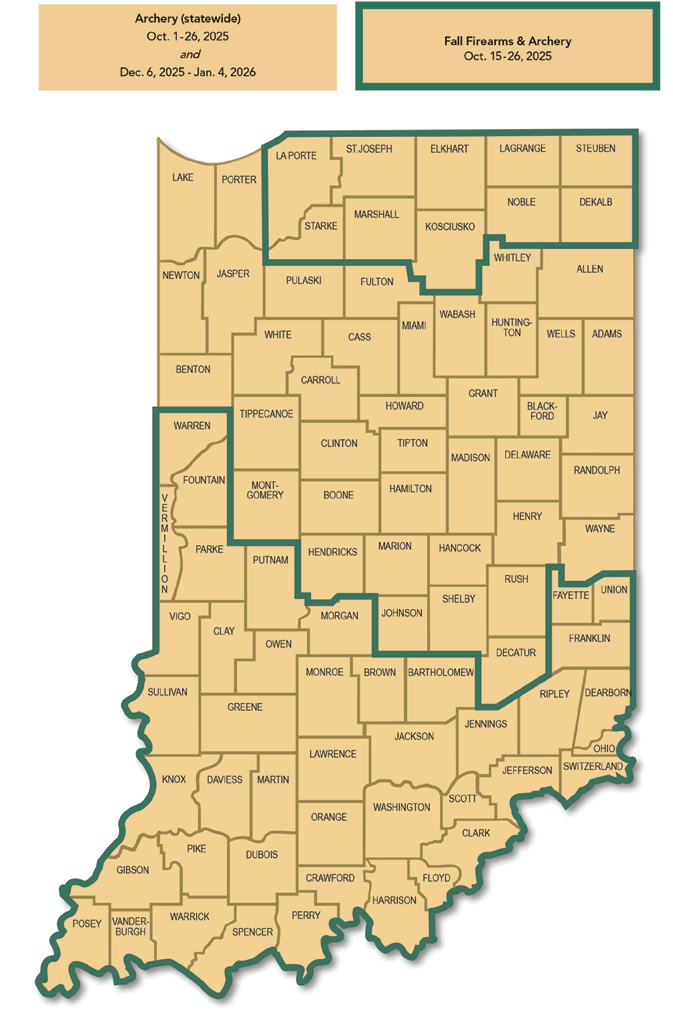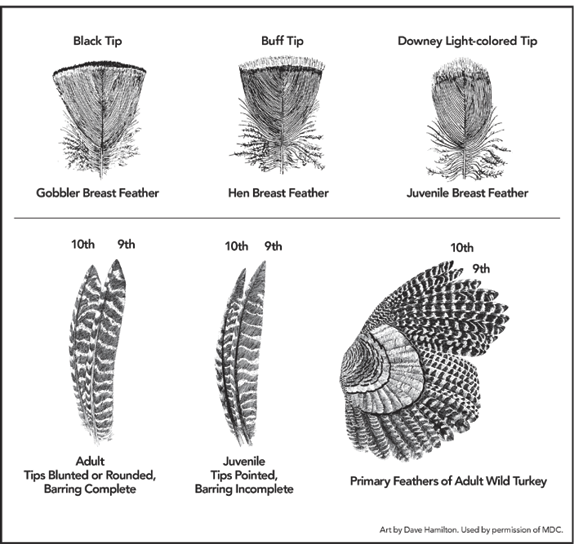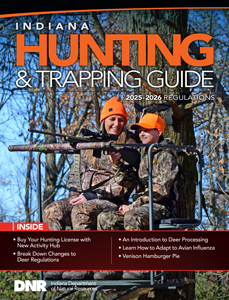Wild Turkey
License Requirements
To hunt wild turkey, a valid turkey hunting license and Gamebird Habitat Stamp are required.
Those who have a lifetime comprehensive hunting, lifetime comprehensive hunting and fishing, or resident or nonresident youth hunt/trap license can hunt turkey and do not need to purchase the Gamebird Habitat Stamp because it is included with those license types.
A separate turkey hunting license is required when hunting during the spring and fall seasons.
Gamebird Habitat Stamps are good for both spring and fall seasons in the same calendar year.
Regardless of whether you have harvested a turkey yourself, you can only assist another hunter by calling if you are licensed to turkey hunt.
Season and Bag Limits
Fall 2025 - The bag and possession limit for the fall seasons is one bird of either sex, regardless of hunting equipment used or what portion of the season. Fall archery season (including crossbows) is statewide from Oct. 1-26, 2025 and Dec. 6, 2025 - Jan. 4, 2026. Fall firearms season is from Oct. 15-26, 2025 in specific counties. See the map below.
Spring 2026 - The spring season runs from April 22 - May 10, 2026. The bag limit is one bearded or male turkey for the spring season. Spring turkey hunting is allowed statewide.
2025 Fall Turkey Firearms & Archery Seasons Map

Reserved Hunts
Reserved turkey hunts are scheduled at select DNR Fish & Wildlife areas.
Reserved turkey hunts also take place at Big Oaks and Muscatatuck National Wildlife Refuges. Applications and draws are managed through the DNR reserved hunt system. A $1 tech fee is charged for each hunt application. For more information or to apply during open hunting application periods, visit the Indiana DNR Reserved Hunt page.
Turkeys harvested at a reserved hunt count toward the hunter’s season bag limit.
Youth Season
For information about the youth season, see Youth Hunting.
Legal Equipment
Turkeys can be hunted only with:
- A .410 caliber and 10-, 12-, 16-, 20-, or 28-gauge shotgun loaded with pellets of size No. 4, 5, 6, 7, or 7½, or with Tungsten Super Shot 8,9 and 10. Shot sizes smaller than size 7½ must be made of Tungsten Super Shot or equivalent pellet density only, such as Tungsten Super Shot 8, 9 and 10. Nontoxic shot is required while hunting turkey on some DNR properties. Call the property you are interested in hunting on for additional information.
- A muzzleloading shotgun not smaller than 20-gauge and not larger than 10-gauge, loaded with pellets of size 4, 5, 6, 7, 7½, and Tungsten Super Shot 8, 9 and 10. Combination loads using shot sizes other than these are illegal.
- Bow and arrow
- A crossbow
Hunting Hours
Wild turkeys may be hunted only from one-half hour before sunrise to sunset. All DNR properties managed by the Division of Fish & Wildlife have spring season hunting hours one-half hour before sunrise until noon for properties on CT and until 1 p.m. for properties on ET. Mushroom hunters are required to stay out of the field until after this time during the spring season.
Tagging Requirements
Immediately upon killing a turkey, the hunter must complete a temporary transportation tag on paper stating the hunter’s full name, address, sex of the turkey, license number (if applicable), and the date the turkey was taken before transporting the turkey from the field. To download and print a temporary transportation tag for turkey season, visit the Season Resources section on the Indiana DNR Turkey Hunting page.
Reporting Requirements
Hunters are required to check in their harvested turkey within 48 hours of the kill. This can be done one of three ways:
- Hunters can self-report harvests online using the DNR’s CheckIN Game system available through the Indiana DNR Activity Hub on Go Outdoors Indiana.
- Calling 260-368-5880 (No fee)
- Find a check station, license vendor, or participating retailer to file your harvest information through the CheckIN Game system at the Indiana DNR CheckIN Game page, or contact DNR Customer Service at 317-232-4200 or 877-463-6367 (toll-free).
Once the turkey is registered with the CheckIN Game system, a confirmation number will be generated. The number must be recorded on a temporary transportation tag and kept with the turkey until processing begins.
Hunter Orange
Turkey hunters must meet hunter orange requirements while hunting turkeys Dec. 6-21, 2025. See hunter orange requirements in General Information.
Fair Chase
While hunting wild turkey, it is illegal to use or possess a dog, another domesticated animal, a live decoy, a recorded call, an electronically powered or controlled decoy, or bait. An area is considered baited for 10 days after the removal of the bait and affected soil, but an area is not considered to be baited that is attractive to wild turkeys resulting from normal agricultural practices.
Turkey Info Line
Have questions about turkey hunting regulations? Call the Turkey Info Line at 812-353-8281.
Fall Wild Turkey Sex and Age Determination
If no obvious leg spur:
- use breast feathers to determine sex and wing tips to determine age (amount of barring and shape of 9th and 10th primary tips)
If obvious leg spur, then bird is a male:
- adult male: 1/2 inch or longer
- juvenile male: less than 1/2 inch

How Wild Turkey Season Dates are Determined
Youth Spring: Two consecutive days beginning on the Saturday immediately before the start of the spring turkey season.
Spring: The first Wednesday after April 20 and continuing for an additional 18 consecutive days.
Fall Archery: Oct. 1 to the end of the fall turkey firearms season; the first Saturday after the closing day of deer firearms season through the first Sunday in Jan.
Fall Firearms: The first Wednesday after Oct. 14 and continuing for an additional 11 consecutive days.
Find the complete Indiana hunting and trapping regulations in the Indiana Administrative Code, Title 312, Article 9, available on the Indiana General Assembly website.
Report Turkey Broods:
Help Indiana DNR monitor summer production of wild turkeys. Your reports assist in determining best management practices for wild turkey. For more details or to report July and August turkey broods, visit the Indiana DNR Turkey Brood Reporting page.

